Roman Consuls Seized Power Through Intimidation, Bribery And Show Business
Ellen Lloyd - AncientPages.com - During the days of the Roman Republic, two consuls were elected. They served one year before they were replaced. If a consul died during his term (not uncommon when consuls were in the forefront of battle) or was removed from office, another would be elected.
Because a consul's imperium extended over Rome, Italy, and the provinces, becoming a Roman consul was a matter of prestige and power.
So, what qualifying criteria were future consuls expected to have in order to seize power? There is a saying that cheating is often an efficient method to get what you want, and in the case of Roman consuls, this was undoubtedly true.
Credit: Adobe Stock - Massimo Todaro
Intimidation, bribery, and show business were all part of a regular agenda for a Roman who wanted to become a consul and part of the Roman government.
Of course, much more was required to gain the position of a consul. He was expected to have tremendous confidence and the solid education necessary to be a great speaker. He must master the art of rhetoric. In other words, his speaking or writing must be persuasive. '
It never hurt to marry into a wealthy family because it was a smart way of quickly getting votes. In ancient Rome, it was common that wealthy and powerful families supported each other through a form of an alliance known as amicitia which can be described as Roman friendship, strongly regulated by ethical norms and social expectations.
Being a showman was a must. The more one could entertain people; the better were the odds of being elected. As Marcus Tullius Cicero once said: "Surround yourself with large numbers of people from every class and rank… Make sure your campaign has plenty of ceremony, brilliance, and entertainment for the people."
Intimidating rivals was very common in Rome. A man who wanted power was expected to use all necessary means to reach his goal. Intimidating could include inciting riots or hiring gladiators to beat up people.
There were also two forms of bribery common during the early days of the Roman Republic. Direct bribery could be used to pay officials with money in return for votes. Another option was indirect bribery based on providing free grain, entertainment, and outdoor banquets.
A good way of becoming more powerful was to become a mob favorite and organize a series of gladiator games the public loved.
Once a man became a Roman consul, he was responsible for war, justice, and finance. He was the highest elected political office of the Roman Republic, and the consulship was considered the highest level of the cursus honorum (an ascending sequence of public offices to which politicians aspired).
Yet, it seems strange that a man who seized power through injustice was later responsible for justice. Fortunately, there were also so-called co-consuls whose job was to ensure no individual could abuse the executive power.
Updated on October 22, 2023
Written by Ellen Lloyd – AncientPages.com
Copyright © AncientPages.com All rights reserved. This material may not be published, broadcast, rewritten or redistributed in whole or part without the express written permission of AncientPages.com
Expand for referencesDr Barbara Levick - The Government of the Roman Empire
All About History Magazine, Issue 9
More From Ancient Pages
-
 Archaeologists Encounter A 1,500-Year-Old Mystery In Kent, UK
Archaeology | Mar 16, 2022
Archaeologists Encounter A 1,500-Year-Old Mystery In Kent, UK
Archaeology | Mar 16, 2022 -
 Is A Gigantic Ancient City Hidden Underwater In The Bermuda Triangle?
Featured Stories | Jul 8, 2014
Is A Gigantic Ancient City Hidden Underwater In The Bermuda Triangle?
Featured Stories | Jul 8, 2014 -
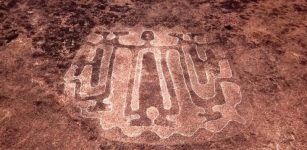 Intriguing Petroglyphs Reveal Traces Of A Lost Ancient Civilization In India
Archaeology | Oct 4, 2018
Intriguing Petroglyphs Reveal Traces Of A Lost Ancient Civilization In India
Archaeology | Oct 4, 2018 -
 Evidence Of Early Human Habitats Linked To Past Climate Shifts Discovered By Scientists
Archaeology | Apr 13, 2022
Evidence Of Early Human Habitats Linked To Past Climate Shifts Discovered By Scientists
Archaeology | Apr 13, 2022 -
 Celtiberians: Intriguing Martial Culture And Their Skilled Warrior Infantry
Civilizations | Jul 13, 2024
Celtiberians: Intriguing Martial Culture And Their Skilled Warrior Infantry
Civilizations | Jul 13, 2024 -
 North America’s First Languages Originate From Siberia
Linguistic Discoveries | Apr 10, 2024
North America’s First Languages Originate From Siberia
Linguistic Discoveries | Apr 10, 2024 -
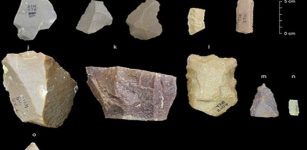 Ancient Stone Tools Found In India Suggest Humans Ancestors May Have Left Africa Much Earlier Than Previously Thought
Archaeology | Feb 5, 2018
Ancient Stone Tools Found In India Suggest Humans Ancestors May Have Left Africa Much Earlier Than Previously Thought
Archaeology | Feb 5, 2018 -
 Susanoo-no-Mikoto – Shinto God Of The Sea And Storms Was Banished From Heaven
Featured Stories | Nov 23, 2018
Susanoo-no-Mikoto – Shinto God Of The Sea And Storms Was Banished From Heaven
Featured Stories | Nov 23, 2018 -
 Aboriginal Legends Tell Millennia-Old Stories Of Events In The Sky
Myths & Legends | Mar 6, 2015
Aboriginal Legends Tell Millennia-Old Stories Of Events In The Sky
Myths & Legends | Mar 6, 2015 -
 Weird Archaeological Discovery In Ancient Scottish Cave – A Neolithic And Celtic Mystery
Featured Stories | May 30, 2024
Weird Archaeological Discovery In Ancient Scottish Cave – A Neolithic And Celtic Mystery
Featured Stories | May 30, 2024 -
 Early Christian Crypt Unearthed In Zaldapa Fortress, Bulgaria
News | Sep 7, 2015
Early Christian Crypt Unearthed In Zaldapa Fortress, Bulgaria
News | Sep 7, 2015 -
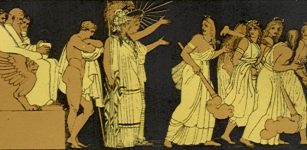 Legendary Furies – Angry And Monstrous Women Of The Underworld
Featured Stories | Dec 23, 2014
Legendary Furies – Angry And Monstrous Women Of The Underworld
Featured Stories | Dec 23, 2014 -
 Mysterious Gold-Colored Chariot Washes Ashore In India – But Where Did It Come From?
News | May 12, 2022
Mysterious Gold-Colored Chariot Washes Ashore In India – But Where Did It Come From?
News | May 12, 2022 -
 What Was It Like To Be A Student In The Middle Ages?
Ancient History Facts | Jun 6, 2019
What Was It Like To Be A Student In The Middle Ages?
Ancient History Facts | Jun 6, 2019 -
 Top 10 Discoveries About Our Ancient Ancestors In 2023
Archaeology | Dec 29, 2023
Top 10 Discoveries About Our Ancient Ancestors In 2023
Archaeology | Dec 29, 2023 -
 On This Day In History: Johannes Kepler ‘Father Of Modern Astronomy’ Was Born – On Dec 27, 1571
News | Dec 27, 2016
On This Day In History: Johannes Kepler ‘Father Of Modern Astronomy’ Was Born – On Dec 27, 1571
News | Dec 27, 2016 -
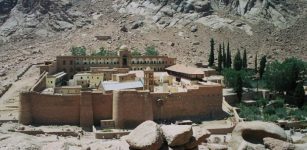 Ancient Scriptures With Lost Languages Discovered Inside Saint Catherine’s Monastery On The Sinai Peninsula
Archaeology | Aug 29, 2017
Ancient Scriptures With Lost Languages Discovered Inside Saint Catherine’s Monastery On The Sinai Peninsula
Archaeology | Aug 29, 2017 -
 Large Mammoth Tusk And Bones Buried For Thousands Of Years Found In North Dakota
News | Jan 8, 2024
Large Mammoth Tusk And Bones Buried For Thousands Of Years Found In North Dakota
News | Jan 8, 2024 -
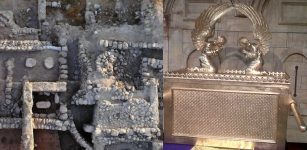 Mysterious Stone Table Found At Biblical Temple In Jerusalem – Evidence Of The Ark Of The Covenant?
Archaeology | Dec 20, 2019
Mysterious Stone Table Found At Biblical Temple In Jerusalem – Evidence Of The Ark Of The Covenant?
Archaeology | Dec 20, 2019 -
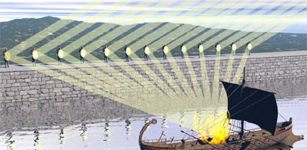 Giant Solar Mirrors And Sophisticated Lenses – Advanced Ancient Technology Used By Our Ancestors
Ancient Technology | Jun 15, 2020
Giant Solar Mirrors And Sophisticated Lenses – Advanced Ancient Technology Used By Our Ancestors
Ancient Technology | Jun 15, 2020

